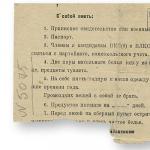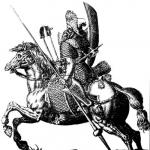Code of officers.
Honor is the main inner moral dignity of the Russian officer, his prowess, the nobility of the soul and a clean conscience. The army, moving the sense of officer's honor, is an invincible force, a real guarantor of state being and peaceful prosperity of Russia.
Russian officer is a noble defender of the Fatherland, the name is honest, the title is the highest. Honor is the main jewel for the Russian officer, the sacred duty of which to maintain it clean and impeccable. Honor protects the dignity of the officer's title, obliges to make excellent deeds, great affairs, utilities, to believe "soul their backwards".
The high title of the Russian officer is not led to officers. He is deserved with all his life and are worn with a high head. Not every Russian by origin, put on the uniform, automatically becomes a Russian officer. A Russian officer may not be Russian by origin, but putting his life for the benefit of our Fatherland - Russia.
Russian officer - warrior in spirit. So it was in all a century. Today there is a war for the soul of man, a soldier. Russia and the Russian army are the last "holding" from the offensive of the Satanian "new world order". While faith will not be a support officer, the army itself will not be able to be a support of society and the state. "Do not be nervous, do not fall into the beauties, not tormented by God ... If you are a warrior, then fight!"
Fatherland is the highest value of the Russian officer. The main thing is Russia, everything else is transient: "I am, a Russian officer, I have the honor, but I live for the sake of serving the Fatherland ... I agree to live and die without a name, always remembered about the main thing: if only the name of the homeland remains in holiness.
To love your fatherland - Russia, know her story, comply with the glorious traditions and be a noble citizen and patriot, do not fall in spirit under any circumstances, do not stop any obstacles. Do not allow treason and betrayal, to be sinking to be faithful people and Fatherland, to serve him true, to the last drop of blood to protect it from external and internal enemies.
Aware of personal responsibility not only for the combat readiness of the entrusted part and the safety of their surroundings, but in general, for the defense of the Russian state, the state of its armed forces, for victory and defeat, the development of military art, the improvement of military affairs, especially in the conditions of modern information and psychological, financially -Economic, sabotage-terrorist wars, having a total nature and striking all state fixes: territory, economy, management, public consciousness, moral spirit.
Constantly search and extract yourself the honor of the example and the dignity of great ancestors, rely on their traditions and covenants; Study military history and use her lessons to strengthen the Russian army, the continuity of the officer corps.
Tirelessly develop the qualities necessary to military man: honesty, selflessness, truthfulness, straight matters, fragrance, modesty, patience, constancy, patronage weak, innocent and offended; To educate discipline, decisive character, will to victory, "diligence to the general case and loyalty to the service", insignificancy, composure, initiative, courage, courage, courage, cheerfulness, endurance and other military virtues.
Be a person creative, self in actions and thoughts, noble in actions and intentions; "Replace the case with reasoning, and not to keep the military charter, the blind wall"; constantly train your mind, expand the cultural outlook; To be able to recognize and develop the talents of their subordinates.
Know the laws of Russia and military statutes, deeply understand the military business, the current situation, the receptions and ways of war against Russia, being a professional, incessantly improving in the subject of their service; Always behave and act "how honestly, the faithful and brave officer must"; Responsibilities to fulfill zealously and diligently, constantly meaning the benefit of the service and state interest - selfishness and careerism contradict the consistence of civil service.
Holy blossie and read the military banner of the military unit and the symbols of Russian glory and valor. The banner is the "soul of the army", the symbol of honor and validity of the defenders of the Motherland, the personification of the connection of the glorious past with a worthy present and future, a reminder of the debt. Do not forget that the presentation of banners and standards is the highest award, and their loss is a crime and shame.
Strive to become not just a military specialist, a combat leader of subordinates in the army or in civil life, but also a ideological inspirer, the Lord of Russian hearts, a subtle psychologist and a propagandist; To be able to win not only by the sword, but also in the word, to own eloquence techniques; To fight against decomposing the army and the state of anti-state and pacifist teachings.
Seek victories of "low blood", fight courageously and brave, not forgetting about prudence; In a word, a business and personal example of encouraging warriors to show resistance in battle, not to retreat without an order, to fight until the last opportunity, to die with honor and glory; troops to fight led, and not send; Do not regret yourself, do not avoid difficulties, show personal courage, contempt for hazards and death; Do not despair during lesions, but to pay them for the benefit of future victories; Captive to behave adequately, take all efforts to return to the system and continue the struggle.
For the Russian officer "Soldier is more expensive to himself"; He is "Brantz", "Vityaz", "Miracle Bogatyr". Take care of the soldiers, treat them carefully, humoring: to educate them in piety and loyalty, "hardworking hunt for military service"; teach with a sense, "without cruelty and hurry"; To achieve a durable assimilation of the techniques and actions, the basics of military art.
For a Russian officer, a partnership is dedication and sacrificial readiness to help both in battle and in everyday life. Crepe's officer fraternity, the ability "against the enemy at the same time to do"; "Neither a word, nor the business of dishonorable dishonor, in the inextricable love, peace and harmony, to dwell respect to provide respect; show mutual assistance and mutual assistance, hold the counterpart from bad actions; To read the sorrowful memory and the prayer of the battle on the field and thus brought their life to the altar of the Fatherland, to keep memories of their exploits.
The officer must always keep the word. Already from respect for himself, he must be the owner of his word. No one dares to doubt his honest words. Increment is a sign of lack of courage, and therefore it affects the honor of the officer.
Imperial officer life is a firm knowledge and faith in the fact that the "Russian army, accustomed to defeat, can be applied separate defeats, but it cannot be defeated ... The army, entering the war, is obliged to believe that at the end it will be victory. Both Pahohamber, and soldiers shall suffer the devious for the sake of the final result. Do not be this mounted goal - what then our efforts? "
A special honor is to become under the humiliated banners, blamed by the enemy and undertaken in the people to win the next campaign and not allow more defeats.
The difficult and noble profession of the officer is the case right and useful for the Russian people and Russia. It is not profitable in monetary or career relations. The dignity of the officer lies in dreams and the desire to make a career and become a commander. To distinguish between the service and in affairs against the enemy. Otherwise, it is better to immediately go to "trade with suspenders or beet marmalade." The honor of the officer does not allow being a careerist, even smart and knowledgeable, and not to put a career higher than the interests of Russia!
"Make your own business, keep the word, tell the truth, do not rise, refrain from exorbitant drinks and snacks," learn from others, including the enemy of energy, businesslike and punctuality, be frank, "but in the countries that not They hurt my honor or honor of my state. "
For the Russian officer, everything is our past, the entire present and the whole future is embodied in one great and comprehensive word - Russia.
Having chosen the Sovereign Service, whether the officer, the ensign, Michman, Sergeant, the soldier must always remember that they serve and sacrifice his life for the highest truths that "they don't have a second depreciation" and "swear only once." The officer of honor cannot go into a reserve or resignation.
🙂 Dear my reader, find a little time and read the Codex of the Russian Officer of 1804. Following these rules, you will avoid many vital mistakes.
Today we are in another time, from 1804 we are separated from more than 200 years and a whole Soviet era. But the word "honor" will always be relevant. " Honor can only be lost once " EM. Kaparev
Code of Honor of the Russian officer
- 1. Do not promise if you are not sure that you will perform a promise.
- 2. Hold yourself simply, with dignity, without fondness.
- 3. It is necessary to remember that the border where the full advantage of politeness ends and lowlands begins.
- 4. Do not write rash letters and reports.
- 5. Less revelaced - you will regret. Remember: My tongue is my enemy!
- 6. Do not Kuti - the vastness will not prove, but you compromise yourself.
- 7. Do not rush to converge on a short leg with a person who did not know enough.
- 8. With comrades. Money spoil relations.
- 9. Do not accept offensive comments, sharpness, ridicule, said. Be above this.
- 10. If you can't say anything good about someone, then refrain to speak and bad.
- 11. Neither whose advice is not neglecting - listen.
- 12. The power of the officer is not in the gusts, but in unreal calm.
- 13. Take care of the reputation of a woman entrusted to you, whoever she is.
- 14. There are provisions in life when it is necessary to make your heart be silent and live by reason.
- 15. The mystery reported by you at least one person ceases to be a mystery.
- 16. Be always alert and do not bloom.
- 17. Try so that your words are soft, and the arguments are hard.
- 18. In public masquerades, officers are not taken to dance.
- 19. Talking, avoiding gestures and do not elevate a voice.
- 20. If he entered into society, in whose environment is the person with whom you are in a quarrel. That, healthy with everyone, is customary to feed his hand and him.
- 21. Nothing teaches that the awareness of his mistake. This is one of the main means of self-education. It is not mistaken only the one who does nothing.
- 22. When two people quarrel - always both to blame.
- 23. Authority is purchased by knowledge and service. It is important that the subordinates respember you, and not afraid. Where fear - there is no love, and there is a cured ill-faith.
- 24. There is nothing worse than indecision. Better worst solution than hesitation or inaction.
- 25. Soul - God, the heart - a woman, debt - Fatherland, honor - to anyone!
What is the honor of the officer
The Code of Honor of the Russian Officer - "Honor is the main jewel for an officer, whose sacred duty to maintain it in purity and impeccability." In the sensible dictionary of Dalya, an explanation: "Honor - the inner, moral dignity of a person. Valor, honesty, nobility of the soul and pure conscience. "
The officers of the Russian army called "white bone", implying a clean conscience and an unwitting honor that were for the officer above all. As far as honest (or dishonor), people are judged mainly around, public opinion is being formed. Usually people highly appreciate those who are "human honor."
"Honor is a shrine of an officer, she is the highest good, which he is obliged to store and keep clean. Honor - his reward in happiness and consolation in the mountain, it does not tolerate and does not carry any spots "M.S. Galkin
A sense of self-esteem did not have anything in common with chowls, climbing or a sense of superiority over the civilian population.
"On the contrary, an officer must respect any title and behave with the same dignity with all classes of society. Moreover, in relation to the people below for education. He should not descend to the level of their morals, and on the contrary, try to raise them to their own height. "
The nobility is the ability to sacrifice personal interests in favor of others, generosity, inability to humiliate and humiliate others.
With the transition, mainly on the contract basis, the requirements for compliance with military personnel relating to the concepts of military honor and dignity have decreased. And there is an explanation.
Previously, for officership, the service in the army was the meaning of all life and was not limited to the contract for the contract. Today, servicemen only fulfill the constitutional debt and implement their right to work through the passage of military service.
Obligations on the observance of moral and moral principles relating to military honor of servicemen, the contract does not contain. I think the orders to have a conscience or honor can not be in nature. This is brought up in yourself from childhood. "Take care of honor, and a dream dress."

"Russian officer" is the definition of a special breed of people. Rather, the title than the title, uniting several eras of our story at once. And not every Russian military can really be considered a Russian officer. Probably, everyone remembers this quote: "... What is the honor of the officer, I know - at the front of this quickly studied"? Replica Vladimir Sharapova from the "Meeting Place cannot be changed." Although in a formal officer he was Soviet, but in spirit - Russian.
The point, of course, is not in degenerate qualities. Resistance, nobility - everything is taught. How to learn to be a Russian officer. For this, there was a special set of rules, which - let and informally - was supposed to be observed. In the Russian army, from the times of Peter I, there was a charter. Already, Petrovsky "Article Military" of 1715 regulated the basic rules of military science, army discipline and subordination.
However, there was another, informal set of rules of the officer's behavior. Those rules that were made from the officer of this gentleman. For a long time, some single writer of the Military Code of honor, like the Japanese Boujido, was not in Russia. He appeared - coincidence or not? - In 1904, a year of the Russian-Japanese war. "The advice of the young officer" was written by Rothmistrome Valentin Mikhailovich Kulchitsky. In fact, this is a set of already existent unwritten rules, Kulchitsky only born them together. At one time it was the most popular brochure, now it is thoroughly forgotten: in the period from 1915 to 1917, she sustained six editions.
Many of the rules of the behavior listed in the "Councils ..." are universal and use any man. We give some of them:
- If you cut and arrive, everyone will hate you.
- Be polite and modest in the passage with all people.
- Do not promise if you are not sure that you will perform a promise.
- Keep yourself simply, with dignity, without fondness.
- Be a weathered, correct and tactful always, with all and everywhere.
- Be triggered and warning, but not annoying and flattering. Quality in time to leave not to be superfluous.
- It is necessary to remember that the border where the full advantage of politeness is ends and where low-planness begins.
- Do not Kuti - this vice will not prove, but compromise yourself.
- Do not rush to converge on a short leg with a person who did not know enough.
- Avoid cash accounts with comrades. Money always spoil relations.
- Himself, if you can, help a comrade monetary, but personally avoid taking, as it drops your dignity.
- Do not make debts: do not swarm yourself. Live by means.
- Do not accept insult comments, sharpness, ridicule, said, which is often on the streets and in public places. Be above this. Get away - do not lose, but get rid of the scandal.
- If you can't say anything good about some, then refrain to speak and bad if you know.
- Neither whose advice is not neglecting - listen. The right to follow him or not will remain for you.
- You can take advantage of the good advice of the other - art is not less than to give a good advice to yourself.
- Honor tempering courage and engraves courage.
- The boss, not gentle by the pride of his subordinates, suppresses a noble desire to become famous and the moral power drops.
- Take care of the reputation of a woman who trusted you, whoever she would be.
- There are provisions in life when it is necessary to make your heart be silent and live by reason.
- Guide in the life of an instinct, a sense of justice and a debt of decency.
- Be always alert and do not bloom.
- Try so that your words are soft, and the arguments are hard. Try not to annoy the enemy, but to convince him.
- Talking, avoiding gestures and do not elevate a voice.
- There is nothing worse than indecision. Better worst solution than hesitation or inaction. The missed time will not return.
- He who is not afraid of anything is more powerful than those who are afraid of everything.
- When two people quarrel, always both to blame.
- The strongest delusions are those who have no doubt.
- It is clear by the way to be silent.
- No one who is indifferent to the praise, but the one who is attentive to the censures.
Prepared Alexander Ryazantsev
Preface to the publication of 1916
The "advice of the young officer" issued by the third edition now as a result of military time is even more necessary and useful. The accelerated issues of young people in officers do not give them opportunities and time to learn in schools of all the subtleties of tradition, the right look into the essence of military education and discipline.
The young officer will have independent work on himself. Here for this work, this leadership will have invaluable services to each officer. It will give him useful tips and instructions on many questions of the upcoming service. Laconization of presentation by individual aphorisms guarantees rapid memorization and the ability to find the necessary help at any time. If we take into account that the misdemeanor of peacetime in the military becomes crimes, they are punished especially harsh, it will become even more obvious value of the tips collected here in a compressed form. They give an opportunity to an officer to avoid many mistakes, to figure out what is legitimate and what is criminally, to understand everything that is required from him to be good, which does not drop their dignity by the officer.
These tips are equally useful and in advanced positions, and in the rear of the army, where they often come across people of dubious professions and behavior.
This directory will relieve young officers from many mistakes and misses in the service and in privacy. An officer who has not mastered since his new position, which is based on conventions, restraint and military tact, is often lost and does not know how he should do in some cases not provided for by the Charters. A consequence of ignorance in general laws (at least important for the military law on the protection of their own weapons) occur irreparable missions, forcing the officer to leave the regiment or get to court.
We repeat that here are compressed, the everyday rules that, undoubtedly, every officer in the upcoming service will only benefit. These original aphorisms make the officer seriously think about the military service on the merits, and not judge it superficially, on an external form and sucking weapons.
In no charter of these tips, the officer will not find.
The purpose of this kind of work is a desire to prevent inexperienced military youth from a false, destructive step. Here are collected old, but eternal truths that most forgotten, and young officers are unknown.
The release of this reference book is the third edition speaks for itself.
V. M. Kulchitsky "Discipline First of all"
I. Right and essence of military service
Believe in God, be a dedicated sovereign to the emperor, his family and love their homeland.
The first and main responsibility of the soldier is loyalty to the sovereign to the emperor and Fatherland. Without this quality, it is indignant for military service. The intracy object and maintenance of its prestige is based on the strength of the army and the fleet; their qualities and disadvantages respond to the whole country, so it is not your business to get involved in social issues and political curses; Your business steadily fulfill your duties.
Put the above all the fame of the Russian army.
Be brave. But braveness is true and intake. Substitution, inherent in youth, is not courage. Military must always be prudence and think about his actions in cold-blooded and carefully. If you are low and arriving, everyone will hate you.
Obey discipline.
Respect your bosses and believe him.
Fear to break your debt - it will forever lose a good name.
The officer must be faithful and truthful. Without these qualities, the military is almost impossible to stay in the army. Verne is a man who performs his duty; Truthful - if he does not change his word. Therefore, do not promise never if you are not sure that you will perform a promise.
Be polite and modest in the passage with all people.
The best part of the courage is caution.
II. Arrival in the regiment
Arriving in the regiment, the officer arrives according to the mouth. Garn. sl. Art. 400 and 401, i.e. is the regiment commander. In practice, this is followed: it seems to be the office of about 11 hours. The officer seems to be acquainted primarily with a regimental adjutant, which gives all the necessary advice and instructions, since each shelf there are their customs traditions. If the commander of the regiment officer is on the apartment, then, without getting his house, it is necessary to appear secondly, trying to catch: the first time sign or leave a service ticket is not recommended. To serve the commander of the company (hundreds, squadron, batteries), which was assigned. Taking a list with addresses in the senior writer in the Office of the Senior Writing. officers and noting in him married, to make everyone visits, not postponing. It is recommended to have time to make them immediately, one day. Clothing form - front door. Other time: with all official cases, visits, congratulations - ordinary, if not given in the order on the regiment to be in other. Do not make a senior home - leave a service ticket (by no means a business card). Married - a service ticket and a business card. Before submitting the regiment commander and not appearing in the regiment, to appear in public places (theaters, gardens, concerts, evenings) is considered nontactively. Upon arrival in the regiment, the first impression is of serious meaning.
Not yet arrived in the regiment and being on vacation, meeting an officer of his regiment (in the same city), it is necessary to come up to him and first introduce themselves, and the regiment commander will appear.

Officer-dragoon times of Napoleonic wars. 1800-1815
III. Relationships to bosses and to yourself
Remember always you're an officer.
With the bosses, hold on officially.
Remember that the head is always the boss everywhere.
Never criticize the actions and actions of the authorities at all; With someone especially, and God to get rides - at the lower ranks.
Any order of the head of the service in service, in whatever form it is neither expressed (proposal, request, advice), there is an order (dec. Ch. Civil. Court of 1881 No. 183).
If you are older, and on the distribution of posts you will be subordinated to the younger, it is obliged to perform all the orders of the face, over you set, without any barcia (sv. P. P., VII ed. 2, 20).
If I arrived on vacation for three days or less, then, without being personally, it is obliged to certainly send his vacation ticket to Comand. control.
Arriving for more than three days, it is necessary to come personally to the commandant.
At the end of the holiday term, it is obliged to appear again in the curfew or report open letter to the Commander's Office: "This number went to the place of his ministry" (signature).
.In the Russian imperial army there was an informal set of rules of the officer's behavior. Although these rules were unsuistently, each Russian officer knew about them and their observance was maintained in every regiment. For example, it was considered an inexpressive officer to have an actress or singer in the wives. The famous Cossack General and Don Ataman, the hero of the White Motion P. N. Krasnov still, in the rank of Podzhaul, married the daughter of the actual State Advisor Lydia Fedorovna Grinesen, who at that time act as a chamber singer. She sacrificed her career and his favorite hobbies, because otherwise the head of the head of Krasnov would have to leave the Guards Regiment on the Chessy Code..
.
So highly appreciated the honor of the military service by the Emperor, that no compromising connection, no dubious publicity, nothing that could throw the shadow on the officer of his imperial majesty - was not allowed not only by the charters, but also by the collective consciousness of the regimental officers.
By the beginning of the 20th century, when the imperial army finally ceased to be the estate and for more than 20 years a law on universal military service, the consciousness of this high honor began to gradually win, the officer's environment became increasingly inhomogeneous, the overall culture of the army fell, the unsolicited rules have not enjoyed large Responsiveness, and their observance required more and more efforts from the "custom" part of the officers. Therefore, it is no coincidence that at this time - in 1904 - the brochure "Tips to the young officer", compiled by Rotmistrom V. M. Kulchitsky, was published. The book turned out to be very popular and sustained up to 1917 six reissues. Many of the rules of the behavior listed in the "Councils" are universal and remain relevant to this day. Here are these rules here:
- If you are cutting and arriving, everyone will hate you.
- Be polite and modest in severity with all people.
- Do not promise if you are not sure that you will perform a promise.
- Keep yourself simply, with dignity, without fondness.
- Be a weathered, correct and tactful, with all and everywhere.
- Be courteous and preventive, but not annoying and flattering. Quality in time to leave not to be superfluous.
- It is necessary to remember that the border where the full advantage of politeness ends and where low-alphabones begins.
- Do not Kuti - this vice will not prove, but compromise yourself.
- Do not rush to converge on a short leg with a person who did not know enough.
- Avoid monetary accounts with comrades. Money always spoil relations.
- Do not make debts: do not swarm yourself. Live by means.
- Do not take on your own offensive comments, sharpness, ridicule, said, which often happens on the streets and in public places. Be above it. Get away - do not lose, but get rid of the scandal.
"If you can't say anything good about someone, then refrain to speak and bad if you know."
- Do not neglect a poppy council - listen. The right to follow him or not will remain for you.
- You can easily take advantage of the good advice of the other - art is not less than to give a good advice to yourself.
- The boss who does not gentle the pride of his subordinates, suppresses a noble desire to be glorified and the moral power drops.
- Take care of the reputation of a woman who trusted you, whoever she would be.
- There are provisions in life when it is necessary to make your heart be silent and live by reason.
- Guide in the life of an instinct, a sense of justice and a debt of decency.
- Be always alert and do not bloom.
- Try so that your words are soft, and the arguments are solid. Try not to annoy the enemy, but to convince him.
- Talking, avoid gestage and do not exal a voice.
- There is nothing worse than indecision. Better worst solution than hesitation or inaction. The missed time will not return.
- The one who is not afraid of anything is more powerful than the one who is afraid of everything.
- When two people quarrel, both are always to blame.
- The strongest erroins are those who have no doubt.
- cleverly be silent.
- not one who is indifferent to the praise, but the one who is attentive to the censures.






